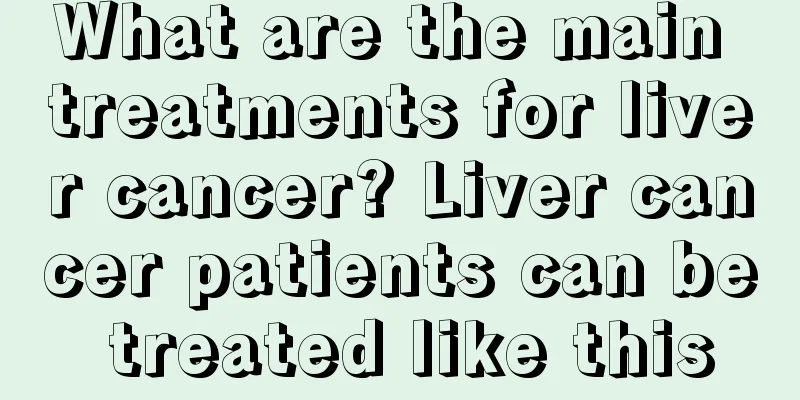Which small details of the body may be cancer

|
Nowadays, "cancer" has claimed so many lives. Why are we so afraid of cancer? There is no particularly good treatment for cancer. We should pay more attention to foods that may cause cancer and pay more attention to our physical health so as not to give cancer any opportunity to take advantage of us. In fact, cancer exists in the body and has precursors. If we have more knowledge of cancer prevention in our daily lives, we will be able to see it clearly. So what small details in the body may indicate cancer? Let me explain them to you one by one. Occasionally, there may be abnormal bleeding Unusual bleeding, even if it stops quickly, should prompt a doctor's visit, especially if you are an older woman. Abnormal bleeding and excessive bruising may indicate leukemia. Bleeding gums and bruised fingertips without gum disease may mean that the blood is not clotting properly, which can also be a sign of leukemia. Rectal bleeding, blood in the stool, or black stools are often considered symptoms of hemorrhoids. However, any form of blood in your stool can be a symptom of colorectal cancer, also known as colon cancer. Let your doctor know about these symptoms as soon as possible and find out the cause to avoid delaying treatment. Abnormal vaginal bleeding, such as bleeding during intercourse or excessive bleeding between periods, may be linked to uterine and cervical cancer. Women should always be aware of symptoms of irregular vaginal bleeding.
With pain and swelling Swollen lymph nodes around the neck, under the arms, and in the groin should be checked out by a doctor, as they are often a sign that the body is fighting an infection. Painless lumps in these locations could be a sign of leukemia, while lumps under the arms could also indicate breast cancer. Any lump that doesn't go away within two weeks requires a visit to the doctor. Pelvic or abdominal pain, bloating, and feelings of fullness are common conditions that often go unnoticed. But if the discomfort has been going on for a while, or it occurs periodically every month, it could be a sign of ovarian cancer and you should see a doctor. Redness, swelling, or tenderness in the breasts may be a symptom of breast cancer. Any unusual changes in your breasts, including heat, irritation, or discoloration, should prompt medical attention.
Watch for breathing and swallowing problems Shortness of breath and difficulty breathing may be early symptoms of lung cancer and should be seen by a doctor if they persist for more than two weeks. Lung cancer patients often describe these asthma-like symptoms occurring without them being physically active. A severe cough or chest pain, similar to bronchitis, can be a sign of cancer, including lung cancer and leukemia. Difficulty swallowing or a persistent urge to clear your throat may be a sign of esophageal or throat cancer and, in some cases, may be accompanied by an unusual feeling of pressure when swallowing.
Intestinal problems Sudden weight loss without a change in diet or exercise can also mean cancer. Although there may be many causes for sudden weight loss, it is prudent to seek professional diagnosis and treatment. Chronic stomach pain and cramping may be a sign of colon, pancreatic, and liver cancer.
Some gradual changes in the skin and nails Nipple changes and discharge can be signs of breast cancer. Watch for changes in your nipples, including flattening, inversion or sideways nipples, and itching or scaling. A dark spot, mole, or birthmark that changes color or shape could be a sign of skin cancer. Unexplained ulcers, ulcers that are slow to heal, or ulcers that bleed continuously may also be signs of skin cancer. Catching skin cancer early may make it easier to treat. Dark lines or dots on your fingernails and toenails, as well as cracks, can be a sign of skin cancer under the nails. White spots on the nails are considered normal, but folded-back nail tips could be a sign of lung cancer.
Recurring fever Fever or infection that lasts a long time or comes and goes may be a sign of leukemia, which causes the bone marrow to produce abnormal white blood cells. The abnormal cells eventually crowd out the healthy white blood cells, making them less effective in preventing infection. The above are some small details about cancer. Friends who have these symptoms must seek medical attention in time, so that we can have a healthy body and stay away from the troubles of cancer! |
<<: Too white toilet paper can increase the risk of leukemia!
>>: How to avoid getting drunk
Recommend
Is glutinous rice easy to digest?
Glutinous rice is a kind of rice. People will use...
It turns out that there are four treatments for acute suppurative pericarditis
Acute suppurative pericarditis is mostly caused b...
Ultrasound imaging features of pancreatic cancer
In clinical practice, ultrasound examination can ...
Do rabbits have parasites?
Rabbits are very cute animals. Many people like r...
You should have enough knowledge about the symptoms of gallbladder cancer
The symptoms of gallbladder cancer have a great i...
How long can you live with gallbladder cancer metastasis
The treatment method for advanced gallbladder can...
What's wrong with nasopharyngeal cancer? What should I do?
What is wrong with nasopharyngeal cancer? What sh...
Treatment of left ovarian teratoma
The treatment methods of left ovarian teratoma ma...
Skin care after radiotherapy for breast cancer
At present, radiotherapy is one of the most effec...
The main common factors causing bone cancer
The occurrence of bone cancer is very common in l...
What should I eat during chemotherapy for liver cancer? See the doctor's advice on diet during chemotherapy for liver cancer
In the middle and late stages of liver cancer, ch...
What are the drugs for liver cancer
Liver cancer is a frightening disease, but the de...
Lateral myocardial infarction
Some people experience pain and discomfort in the...
What should I do if my lips are getting thicker
Everyone has different aesthetic tastes. Some peo...
What to do if you get spots after sun exposure
I believe that most people in life do not pay muc...









